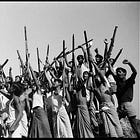Welcome to the Brown History Newsletter. If you’re enjoying this labor of love, please do consider becoming a paid subscriber. Your contribution would help pay the writers and illustrators and support this weekly publication. If you like to submit a writing piece, please send me a pitch by email at brownhistory1947@gmail.com.
Don’t forget to check out our SHOP and our Podcast.

Recommended Reads:
Settler Genocide in Bangladesh’s Tribal Lands
The ongoing siege of Gaza, with its viscerally horrifying images of massacred civilians, starving refugees, and wrangled bodies being pulled from rubble, has become the epicenter of a global conversation about militarized occupation and the systematic destruction of indigenous communities. Intensifying brutality in the West Bank, in which illegal settlers have exploited a culture of impunity to intimidate, assault, and displace native Palestinians who have called these lands home for generations, has similarly renewed calls for decolonization and addressing settler violence. Through the unprecedented online documentation of such crimes against humanity and the widespread fury they have sparked on social media, the world is rightfully becoming more conscious of the barbarity of settler colonialism and the horrors that indigenous peoples across the globe are routinely subjected to.
The newly focused attention on decolonizing indigenous lands should be a call for South Asians and the world’s Brown community to take an honest look at the crimes occurring in our own homelands in the very same vein. The 20th century history of the subcontinent has been defined in large part by the liberation of our people from European colonial powers that have attempted the erasure of our native identities, laid unjust claims to the lands our ancestors have called home, and established control through systematic and genocidal violence. Yet, even in the wake of “decolonization” at the turn of the century, our freshly independent governments seemed to have taken a page out of the British Raj’s book -- asserting exploitative control over minority and marginalized groups while orchestrating the same settler-colonizer brutality we claim to have freed ourselves from. As a Bangladeshi and a Bengali -- a distinction that is often overlooked but is necessary in recognizing tribal groups within my country’s borders who do not identify as Bengali -- national, cultural, and linguistic pride has been a defining element of my nation’s collective identity. We did indeed secure self-determination through generations of martyrdom, protest, and resistance, having emerged from the 1971 Liberation War as no longer East Pakistan but as an independent Bangladesh. But the fact that we unshackled ourselves from an authoritarian government that imposed draconian military rule, actively suppressed cultural self-expression, engineered systematic sexual violence, and barred us from benefiting from our own natural resources, should give us pause. It should push us to consider the treatment of indigenous groups within our borders and the ways in which we are continuing the legacy of the very authoritarianism we fought against. Every time we are confronted by the realities of genocidal settler colonialism and ethnic cleansing elsewhere in the world -- which we have had plenty of opportunities to contend with over the last several months -- we have a responsibility to address and oppose the same inhumanity at home.







